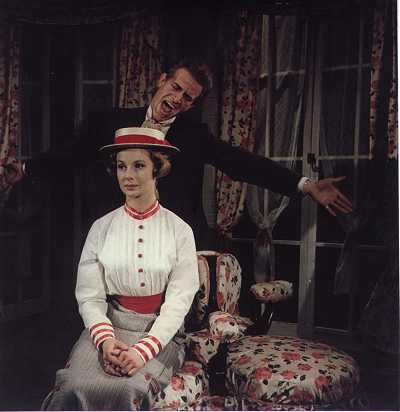Pygmalion
(Role: Professor Higgins)
Ann Firbank Scores As Eliza Dolittle
Shaw described Pygmalion as a romance, but it is its comedy that
we best remember, even from those versions of the story which carry a happy
ending of reconciliation for Eliza and her proud professor.
The production which opened last night at the
Belgrade Theatre, Coventry, dispels any sentimental illusion, for we last see
Eliza setting out to marry Freddie, that big-hearted chump of an
admirer.
As Shaw tells us in his epilogue, this was how the
story really ended. It was a romance only in the wider sense of the
word.
Happy Ending
So much, then, for any of us who like to hang on to
Higgins' final confident air of the original text and believe there could have
been the "happy ending" which the author despised.
One forms the impression that this production by
Richard Mathews - his first as temporary director at the theatre - has been
much influenced by the epilogue. There is in the main characterisations a
foretaste of what is to come and Eliza, in her final verbal battle with
Higgins, conveys more confidence and independence than I have felt
before.
Ann Firbank has brought great beauty to the role and
a considerable understanding of it, but the progression of her accent is hardly
in time with her development, visually, as a lady. Her flower girl speech was
common, but soft rather than raucous, and one felt last night that Higgins's
task was not to be so difficult after all.
At Mrs Higgins's "At Home" she was superb, wringing
the comedy [from] the beautifully-spoken account of how her aunt was "done in",
but by the end of the play she was too natural where she should have been too
perfect.
|
Nevertheless, this was a performance of a most
moving intensity. Few actresses can play on our emotions as she can when her
fine features flicker into a smile at some compliment from the gallant
Pickering or quiver into a sob at some scorn from Higgins.
Vigorous Role
Alan Howard, re-creating the role which his
uncle fashioned with such mastery, proved once more how he has developed at the
Belgrade. This was a powerful, vigorous performance, which suffered only from
lack of variation.
Higgins was a bully, but he was also at times a
cynic. He could hurt with a soft word just as easily as by shouting, and in
ranting too much, Mr. Howard missed one aspect of the character.
There were some admirable supporting
performances in this production, notably a most assured Mrs. Higgins from Molly
Francis, full of grace and dignity, and a cheerfully resigned, rubicund
Dolittle from Julian Somers. |
 |
George Pensotti's Freddie was the most convincing of
the Eynsford-Hills, Chris Castor looked the type of stern housekeeper Higgins
needed and Peter Palmer made an excellent job of Colonel Pickering, though his
comparative youth made one wonder why Eliza did not grow to regard him as
something more attractive than an uncle.
Comparison Value
Patrick O'Connell took the eye and ear among the
crowd in the opening scene, which was staged generally without distinction. An
original photographic treatment for this setting did not come off, though the
designer, Sally Hulke, showed her talent and imagination in the other
scenes.
Do se this production during the next two weeks. It
is entertaining and, as an example of the playwright's craft, it is useful for
comparison with modern works.
With N.K.W. at The Belgrade
Coventry Evening Telegraph, Tuesday, May 3rd,
1960.
